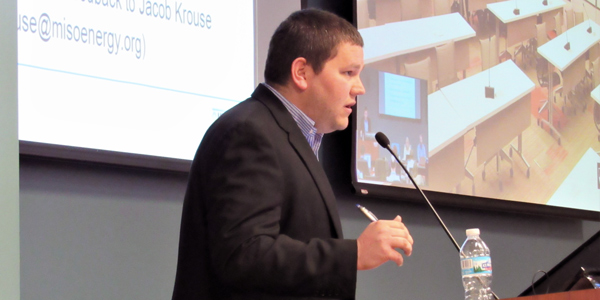By Amanda Durish Cook
CARMEL, Ind. — MISO will pre-emptively refile its current resource adequacy construct for FERC approval Friday in an effort to dispel concerns that a future ruling could undo parts of the plan the commission itself had previously suggested.
MISO’s concerns stem from a July D.C. Circuit Court of Appeals ruling that found FERC overstepped its authority under the Federal Power Act when it prescribed revisions to PJM’s capacity market buyer mitigation rules in 2012 (15-1452).
That D.C. Circuit decision partially vacated FERC’s approval of PJM’s changes to its minimum offer price rule (MOPR) and remanded the case back to the commission for further action. As a result, the commission last week rejected the previously approved MOPR changes and required PJM to reinstate its previous design. (See On Remand, FERC Rejects PJM MOPR Compromise.)
Fearing that parts of its resource adequacy construct could be similarly vacated, MISO said it would refile Module E-1 of its Tariff on Friday, putting language already approved by FERC before the commission once again.
“This filing will contain only our existing Tariff language and will not propose any changes,” MISO corporate counsel Jacob Krouse told stakeholders at a Dec. 13 Resource Adequacy Subcommittee meeting.
In 2011, FERC accepted MISO’s current resource adequacy proposal, which replaced a monthly capacity auction framework with an annual auction and use of coincident peak demand forecasts to establish planning reserve requirements (ER11-4081). In that order, FERC directed MISO to remove its proposed MOPR provisions and instead use a peak load contribution methodology as its default methodology for assigning capacity obligations among other directives.
“We are giving FERC the opportunity to find our original filing just and reasonable … regardless of any procedural defects in the original order,” Krouse said.
Manitoba Hydro’s Audrey Penner asked why MISO’s well-established resource adequacy construct must go before FERC again.
“What is outstanding that would require MISO to refile?” Penner asked.
Krouse called the reasons behind the filing “procedurally complex” and said MISO seeks to pre-empt the possibility that FERC will ask the RTO to refile a revised construct in the event that the commission also overstepped its authority when it approved the original filing six years ago.
“MISO is unsure how and when FERC will act,” Krouse said.
The RTO is asking FERC to decide on the matter by March 1. If FERC doesn’t act on the Section 205 filing before the requested effective date, the filing is automatically considered accepted, Krouse said, though he thinks it “unlikely” the commission won’t address the filing.
Responding to a question from Indiana Utility Regulatory Commission staffer Dave Johnston, Krouse said the RTO will provide three pieces of staff testimony supporting the efficacy of the current resource adequacy construct. FERC liaison Chris Miller also said he expected MISO to quote at length the commission’s 2011 acceptance of the construct.
Northern Indiana Public Service Co.’s Bill SeDoris asked how MISO would respond to a rejection by FERC.
“Where do we go from there?” SeDoris asked, pressing to know whether the RTO would begin operating under pre-2011 resource adequacy rules.
Krouse said his own recommendation would be that MISO continue with its existing construct until the commission acts on either MISO’s refiling or the court’s remand.
PJM has similarly said that restoring its old rules is “not a viable option” and continues to operate according to its filed rate while it awaits FERC action on the ruling.
Dynegy’s Mark Volpe asked how MISO would respond if the commission issues an order on remand before it acts on the filing. Krouse said the RTO would reassess and adapt should that happen.
This fall, Krouse warned that the D.C. Circuit’s ruling limiting FERC’s ability to issue guidance on proposals might sway the commission in the future to issue more rulings that either accept or reject filings in their entirety.





